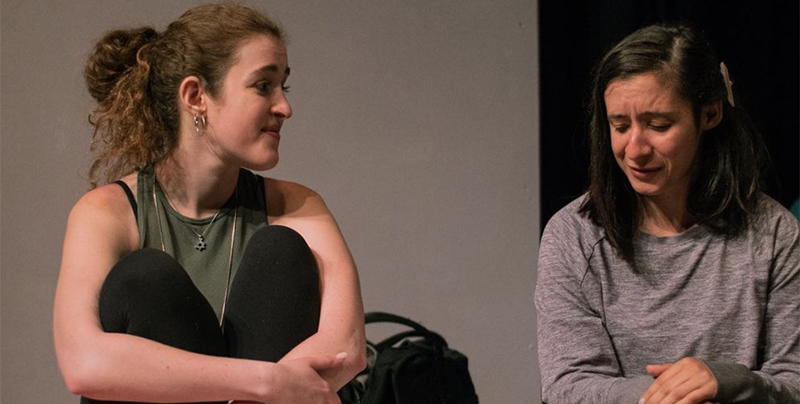Bad Jews is a 90-minute, one-act play written by Joshua Harmon and directed by Yahli Barkan and Samantha Shaw. Presented by the Station Theatre, the production starred a diverse cast of both veteran and new coming actors—Zoe Nemetz, Joshua Altshuler, Nathan Moone, and Gina Maggio—and it ran from July 21 to July 24 for a limited weekend showing.
I had never seen a show at the Station Theatre prior to Harmon’s play, and boy diddy howdy, was that space tight! Nestled among a full audience, packed into motley chairs assorted atop bleacher-like risers, you can’t help but feel on top of whomever you’re sitting next to. And you better visit the bathroom before the show starts because if you have to go during the production, you’ll find yourself a part of the play just walking to the toilet. That being said, Barkan and Shaw found a way to use the limited space to their advantage.
The play takes place in Jonah’s (Moone) studio apartment located on the Upper West Side of Manhattan. The apartment’s floor is barely visible between hulking slabs of inflatable mattresses, blankets, and pillows, and half-empty glasses of water litter every available surface. The only private space available to the characters is the apartment’s off-stage bathroom, separated by the thinnest of walls. Even before Liam (Altshuer) and Melody (Maggio) arrive at the apartment—thereby adding two more bodies to an already cramped environment—I couldn’t help but feel a tight ball of anxiety building in my chest. Claustrophobic and cluttered, the space forced keen awareness of the characters’ close proximity to one another and, by extension, my close proximity to them. And when the characters start bickering at one another, you, too, wish you could crawl inside that thin-walled bathroom to catch a breath. Although I needed to double up on my anxiety medication the next day, I couldn’t help but admire the people behind the scenes for creating such a visceral theatrical experience—as overwhelming as it was. After all, it’s not everyday I have something other than my relationship with my father to talk about at therapy.
At the center of the play is anti-hero Daphna, a college-aged Jewish zealot who advertises her beliefs so brashly, they might as well be tattooed on her forehead (a little joke for anyone familiar with Harmon’s play). Daphna was played dexterously by professional actor Nemetz, who, according to the show’s program, played the same role back in 2016. Nemetz’s role reprisal comes as no surprise considering how expertly she inhabits Daphna’s character. In fact, you sense a deep connection between Nemetz and Daphna that, as an outsider looking in, is as perplexing as it is mesmerizing. For instance, I spent most of the play dumbfounded by Daphna’s arrogance. Her manipulative ploys, cutting insults, and clever affronts pushed me to the edge of my empathetic faculties, making me almost give up hope for a compassionate side to Daphna’s character. Almost. Because just as I gave up hope, Nemetz pulled me back with a devastating combination of charm, imperfection, and vulnerability. Nemetz somehow humanizes an individual even other characters decide is beyond redemption.
Daphna’s hyper-religiosity is then countered by her cousin, Liam, played by Altshuer. Liam enters the scene as the supposed antithesis to Daphna—a self-proclaimed “bad Jew” who exhibits his lapsed faith with shameless pride. However, though Liam feels he is nothing like Daphna, his egotistic snobbery and combative insults are just as bad. In fact, Liam spends most of the play trying to convince the two unwilling moderators of his and Daphna’s argument—his younger brother, Jonah, played by a subtle yet endearing Moone, and his partner, Melody, played by an unremittingly sympathetic Maggio—that his cousin is pretty much the Devil. Liam’s quick-witted and explosive coercion is made even worse once we see just how kind-hearted his partner is. Melody’s character stood out to me as one of the most honestly pleasant personalities on stage, and her presence in such a hostile environment only emphasized its dysfunction.
Bad Jews is an unabashed exposé on how personal tragedy can unearth the tensions, traumas, and controversies buried in a family unit. It illustrates how personal tragedy figures itself at the collective scale, testing individual identities as they re-encounter family spaces. Although some of the play felt limited—the space, its topical scope, the dimensionality of family connections—you can’t help but consider some of these limitations as blessings in disguise. Bare and focused, Bad Jews harnessed its limitations to create urgency, a sense of “being in the middle.” It is a play I haven’t been able to stop thinking about. Bad Jews gave me the opportunity to watch a family unfold before my eyes.
Bad Jews
July 21st to 24th
The Celebration Company at the Station Theatre
223 N Broadway Ave
Urbana








